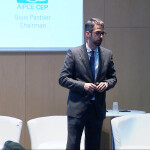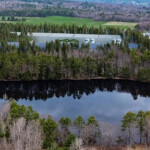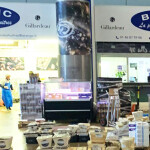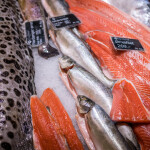Dr. Thierry Chopin of the University of New Brunswick in Saint John and Dr. Shawn Robinson of Fisheries and Oceans Canada’s St. Andrews Biological Station were honored recently with the 2009 Aquaculture Association of Canada Research Award of Excellence for their work in bringing Integrated Multi-Trophic Aquaculture (IMTA) into commercial production.
The Aquaculture Association of Canada began giving the Award of Excellence in 2000 to recognize innovative research in the aquaculture industry.
“We started to talk about IMTA in 1995, and for a few years people didn’t know what we were talking about. But now people are interested in it and we’ve progressed from a small scientific experimental program to being associated with major players in aquaculture,” said Chopin. “What’s rewarding for us is to see recognition that your peers and industry partners believe in what you do.”
Through Chopin and Robinson’s IMTA work, byproducts generated in salmon and cod aquaculture are used to feed and cultivate extractive species that absorb nutrients and particles to create a more balanced and environmentally efficient ecosystem. Nutrients and energy lost in finfish monoculture are recaptured and used to sustain crops of commercial value in IMTA, such as seaweeds and mussels.
“What we realized is that the mussels are good at absorbing certain sizes of particles. But bigger particles need other invertebrates, so we are thinking of adding sea urchins, sea cucumbers and sea worms,” added Chopin. “In monoculture, energy is lost when there’s just one species. But in IMTA that food or energy that would be lost can be recaptured and reused for biomitigation and biofilters that themselves have value because they can be sold.”
This year, IMTA mussels were sold to Quebec, Maine and California. While not yet ready for commercial sale, salmon producer Cooke Aquaculture has expressed interest in using IMTA seaweeds in fish feed, and European companies have expressed interest for use in cosmetics.
Chopin said he hopes to see an improvement in water quality and better conditions for fish to grow in. “We’re just at the beginning of scaling up, and in time we might see improvement of water quality around the system and a more balanced system,” he said.
Chopin also hopes that companies practicing IMTA can be rewarded in the future through a system of nutrient and carbon trading credits.
Back to home >




